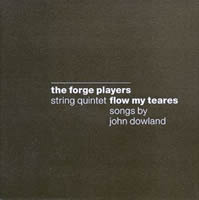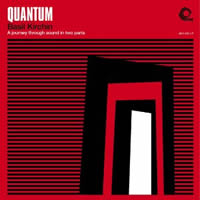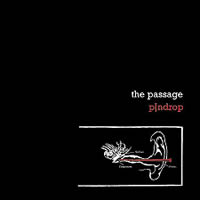Walt’s Ratatouille 8.
|
Walt Mundkowsky [February 2005.]
John DOWLAND: Flow My Teares. The Forge Players (string quintet) with Mikael Samuelson and Freddie Wadling (vocals), Lars Åkerlund (guitar), Hållbus Totte Mattson (Baroque guitar, bouzouki, lute, theorbo), Roger Tallroth (bouzouki, guitar). Atrium 3984-22109-2. Atrium was (is) part of Warner Music Sweden, and boasted a strong ECM influence (see cover). This 1998 CD (available here as Elektra / Asylum 22109) takes a wilder swing at updating John Dowland than ECM’s subsequent In Darkness Let Me Dwell would, so its “fixes” are more fun for the Dowland admirer. Dowland done right is hardly unknown in Sweden (BIS has several superb items from the 1980s and ’90s), but he’s probably new to this bunch. The quintet combines orchestra and folk-rock string players, and the singing presents similar contrast — Samuelson portrayed the Phantom on the Stockholm stage, while Wadling (the gruff voice) has touched several genres since he began in punk rock. Hit songs from Dowland’s three Bookes (1597-1603) vie with consort settings off the 1604 Lachrimae cycle — an adventurous move. Lachrimae Antiquae, the curtain-raiser, is surprisingly solid. Tuning and ensemble sound reflect some thought, and the ECM-like palette has both delineation and weight. Standard Dowland won’t come this near again. “All ye, whom Love or Fortune” shrieks Pierrot — singer hazy among the players, intoning a mad Sprechstimme with wavering high notes. I count “What if I never speed?” a cracked high point. The mode is Goth swaggering, and a “Come, come, come” refrain is lent a vampire’s air. Bowed crashes signal the end, topped by frantic breathing. (“Unquiet thoughts,” the finale, works the same opened vein.) “Flow my teares,” which Elvis Costello sang at Jeff Buckley’s 1997 funeral, is hammed up more yet. Sung unaccompanied in an echoey space, it’s all large gestures and plentiful pauses. Other songs opt for calmer framing. “If my complaints” gets languid backing and a misty, light-toned vocal. The 10:37 “Love stood amazed” avoids dullness with varied support by the group, from lute suggestions to deep bowing. Projected intensity is amusingly wide of the mark in “Come, heavy sleep,” but “Come again: sweet love” takes the nightclub angle with little strain. Of the remaining consort pieces, Semper Dowland semper dolens tries a dynamic leap that may be a rough edit, and Sir Henry Umpton’s funerall has a leader too far in front, but both convey gravity. The dances show lots of country / folk snap — bows slashing, rhythms stomping. Well shy of Dowland’s morbid edge, but defensible. Good notes and song texts are absent, indicative of the target audience. For the true thing, my allegiance to Anthony Rooley’s 1976-80 Consort of Musicke recordings survives, if a bit dented (L’Oiseau-Lyre 452 563-2, 12 discs, O/P but not extinct). Fretwork and Savall (refinement and impact) push further into Lachrimae.
Basil KIRCHIN: Quantum. Evan Parker (sop. sax), Graham Lyons (bassoon), Kenny Wheeler (flugelhorn), Derek Bailey (guit.), Darryl Runswick (bass). Trunk JBH 003CD (http://www.trunkrecords.com/). I first encountered Basil Kirchin (b. 1927) during my film-critic days. Negatives (1968) is an overheated kinkfest notable, if at all, for a Glenda Jackson on the brink of stardom, but Kirchin’s orchestral cues nail the aura of sickness and rot. It’s the fifth of nine movie jobs he took between 1965 and 1973 to achieve the Worlds Within Worlds project, a pileup of free jazz, field recordings and electronics. Two LPs appeared (1971, ’73), but Kirchin felt dogged by his label’s meddling. Still, the albums influenced some ambient, industrial and electroacoustic figures, and have sold for $1,000 on eBay. Quantum (1973) is no reissue, but the pure realization Kirchin always sought. That Eno, Steven Stapleton (Nurse With Wound) and ea composer David Dunn each took something from Kirchin’s example indicates the reach of his discoveries. His jazz soloists perform at a high level, but receive the same scrutiny as other material. The spotlight falls on Esther Kirchin, the composer’s Swiss wife, whose childlike voice has cutting authority (I’m reminded of actress Laura Harris). Early on she intones a verse over synth pads:
It recurs as a creepy song at the end, the tune launched by tacky fairground synth. Kirchin has chosen his title well; the arsenal of tape operations wants to disclose a sound structure inside what is normally heard. Part One sends the jazzmen off to the zoo, and Kirchin arranges goose honks into the first notes of “God Save the Queen” (a bow to the ducks in Stockhausen’s Hymnen?). Moving everything into the same family is the goal. Parker’s long, chattering sax lines merge with the bird conferences, and Lyons’ bassoon joins a gaggle of geese. A seeming marimba, or Bailey’s guitar? Except for some roaring tigers, progress is delicately drawn. After putting musicians in an aviary, Kirchin goes the other way in the more abrasive Part Two — treating shards of autistic speech as jazz improvs. Explosive patterns are plumbed for their value as gesture, and the composer calls one girl’s vocal “worthy of Coltrane and Eric Dolphy.” He organizes this chaotic utterance into episodes with strong dramatic arcs, rising in agitation and intensity. The players pitch in, Runswick’s bass scoring from every angle. The flugelhorn leads of Kenny Wheeler clear a path through the mob, and bursts of unsettling applause act like cinematic wipes. Three decades on the shelf haven’t dimmed Quantum’s startling virtuosity. An important event for ea artists and listeners, though its appeal isn’t limited to them. Trunk has a new disc of unreleased Kirchin (Charcoal Sketches / States of Mind, JBH 005CD); the music from The Abominable Dr. Phibes, a 1971 Vincent Price horror orgy, is on Perseverance PRD004. (Not all of Kirchin’s score is used in the film.)
THE PASSAGE: Pindrop. Dick Witts (pretty much everything). LTM ltmcd 2356 (http://www.ltmrecordings.com/passcat.html). Distributed in the US by Darla (http://www.darla.com/). “Art makes science smell nice, it turns air into sex.” — The Passage, “2711” The Passage (1978-83) was the most cold-eyed and rigorous of the acclaimed Manchester bands of the time (Joy Division, The Fall, A Certain Ratio). Promising EPs in ’78 and ’79 led to an album date, but the trio dissolved when bass and then keyboard mates left. Front man Dick Witts forged ahead. Witts came to poprock late (he was 27 in 1980), after stints as Hallé Orchestra timpanist and Arts Council presenter. Pindrop resulted from a 70-hour week with four-track gear — simultaneously sparse and granite-slab opaque. Witts’ 13 numbers address varieties of outer and inner repression; sudden breaks in synth or vocal timbre could almost be responding to shouted commands we cannot hear. “Fear” and “Troops Out” (of Ulster) amount to a rocky start. Emphasizing key words renders the first bruisingly obvious, and damp sloganeering in the other isn’t aided by a weak, distant delivery. Everything snaps into focus in “Carnal,” a sharp he said-she said bout. Clanging rhythms announce his intent:
Over icy, shimmering textures she replies:
“Watching You Dance” (“pressing on air / through your head and your hands”) is a chilly stalker’s anthem. Organ-like crescendos perhaps refer to those in Resnais’ Marienbad. In “Anderton’s Hall” and “From the Heart,” brutal power is applied. (James Anderton was a Bible-thumping Manchester police chief.) Witts extracts maximum desperation and dread from his limited range in the latter work’s torture scenario. A more insinuating depiction would be Cabaret Voltaire’s “Crackdown” (Virgin CVCD1, 1983). Society’s cogs animate several songs. In single beats and propulsive drumming, “Locust” decries waste in life (“time is a hole”), as does an urgent “16 Hours,” from the vantage of schedules. Tremulous and then growling synth drives a perfume-biz mugging (“2711”):
“Carmen” employs a flighty pace and organ stabs to indicate loss of direction, and zooms in on breaking glass. (Many of these tracks halt abruptly.) Even in this rare company, the closers stand out. “A Certain Way to Go” escorts the band A Certain Ratio into the alley for a thrashing:
“Certain” also sports the most carefully laid out music — synth pedal points with keening or piping lines above, piano and vibraphone plinks for color. Since “Prelude” concerns an interior prison, it’s the darkest cut here:
The music catches the “skating around” mood, inscribing courses without advancing:
Pindrop occupies less than half of the disc’s 75:36 length. The early EPs haven’t much to offer on Witts’ development, except for “$lit Machine” and a draft of “16 Hours,” but the new men (drummer Joey McKechnie and 16-year-old guitarist Andy Wilson) are present, in a Feb. 1981 radio taping. (The Passage’s second album, For All and None, appeared a few months later.) Witts now lectures at university on modern music. His interview with Stockhausen can be found here. The band has inspired a splendid site.
[More Walt Mundkowsky, Walt's Ratatouille]
[Previous Article:
On Themes by Klimt and Mahler]
[Next Article:
Huddersfield Festival 2004: Transpontine Reactions 2.]
|


